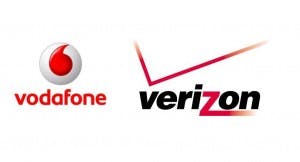Verizon Communications Inc. (NYSE:VZ) just extended a multi-billion dollar olive branch to Verizon Wireless partner Vodafone Group Plc (ADR) (NASDAQ:VOD). Indeed, the company can’t risk friction if it wants to eventually buy out its wireless partner.
A Group Effort

In fact, both Verizon Communications Inc. (NYSE:VZ) and AT&T are roughly similar companies except for the cell phone partner issue. The duo shares an effective duopoly in the cell phone market, have large but declining land-line operations, and are both relying on the cell business for growth. Only AT&T Inc. (NYSE:T) gets to benefit from 100% of that growth, while Verizon only gets 55% of it.
Buy it Back
For years industry watchers have speculated about Verizon Communications Inc. (NYSE:VZ) buying out Vodafone Group Plc (ADR) (NASDAQ:VOD). That sounds like a great business decision, but the price tag would be massive. According to Bloomberg, Verizon believes $100 billion is the right price for the 45% of the business it doesn’t own, while Vodafone Group Plc (ADR) (NASDAQ:VOD)’s thinking is about 20% higher than that. Twenty billion dollars is a big difference.
Aside from the pure cost, the issue of how Verizon would pay such a price tag has to be considered. The company had over $47.5 billion in long-term debt at the end of 2012, making up about 60% of the capital structure. Even at the low end of the price range, the purchase would increase debt to over 80% of the capital structure.
Can it be Done?
The truth is that Verizon has the very type of business that could handle a highly leveraged capital structure. Its revenues are annuity-like in nature, and no single customer accounts for a material amount of the top line. So Verizon could handle such a price tag–only that level of debt could limit its flexibility and give AT&T an edge as bandwidth spending heats up.
Indeed, the mobile world is going through an important change as customers get more accustomed to using bandwidth intensive services. That includes on-the-go video and music streaming. However, the more bandwidth customers use, the more bandwidth that cell providers need.
This is a pretty big issue today. For example, Verizon sold Atlantic Tele-Network spectrum for $233 million in 2010. AT&T recently bought that spectrum from Atlantic for $780 million. Clearly, spectrum prices are jumping fast. If Verizon were to buy out its partner, AT&T could be the big winner.
What about the Partner?
The next question to ask is if Vodafone Group Plc (ADR) (NASDAQ:VOD) is even interested in selling. Verizon Wireless accounts for about half of the European phone company’s profits. Although it has operations throughout Europe and in key emerging markets like India and Africa, it is the Verizon investment that has been the most valuable asset in recent years.
It isn’t clear that a sale would lead to a better company position. Moreover, if Vodofone keeps getting big dividends from Verizon Wireless, the incentive to do a deal isn’t all that high. And Verizon can’t stop the dividend payments if it wants to keep negotiations friendly. A real catch-22 for both companies.
That said, more aggressive investors looking for a western wireless company that has its fingers in emerging markets should probably be at least watching this company. It has a notable dividend yield of around 5% and owns a big, desirable asset.
If it sells the Verizon Wireless stake, it just might push the company’s growth prospects higher as it looks to use the cash. Share buybacks and special dividends could also be on tap. However, an uncertain Verizon Wireless sale isn’t a good reason to jump aboard today.
News, News, News
Verizon and Vodofone are currently being driven by news. That makes each a risky option right now. Both are worth watching, however, since any deal could portend big changes. Vodofone would probably be the more interesting of the two if a sale takes place. AT&T, meanwhile, is probably the most boring of this telecom trio, but that could make its near 5% yield a lot more alluring than Verizon’s around 4% yield. And, it could be the biggest winner if Verizon Wireless gets sold.
The article The Telecom Olive Branch originally appeared on Fool.com and is written by Reuben Brewer.
Reuben is a member of The Motley Fool Blog Network — entries represent the personal opinion of the blogger and are not formally edited.
Copyright © 1995 – 2013 The Motley Fool, LLC. All rights reserved. The Motley Fool has a disclosure policy.